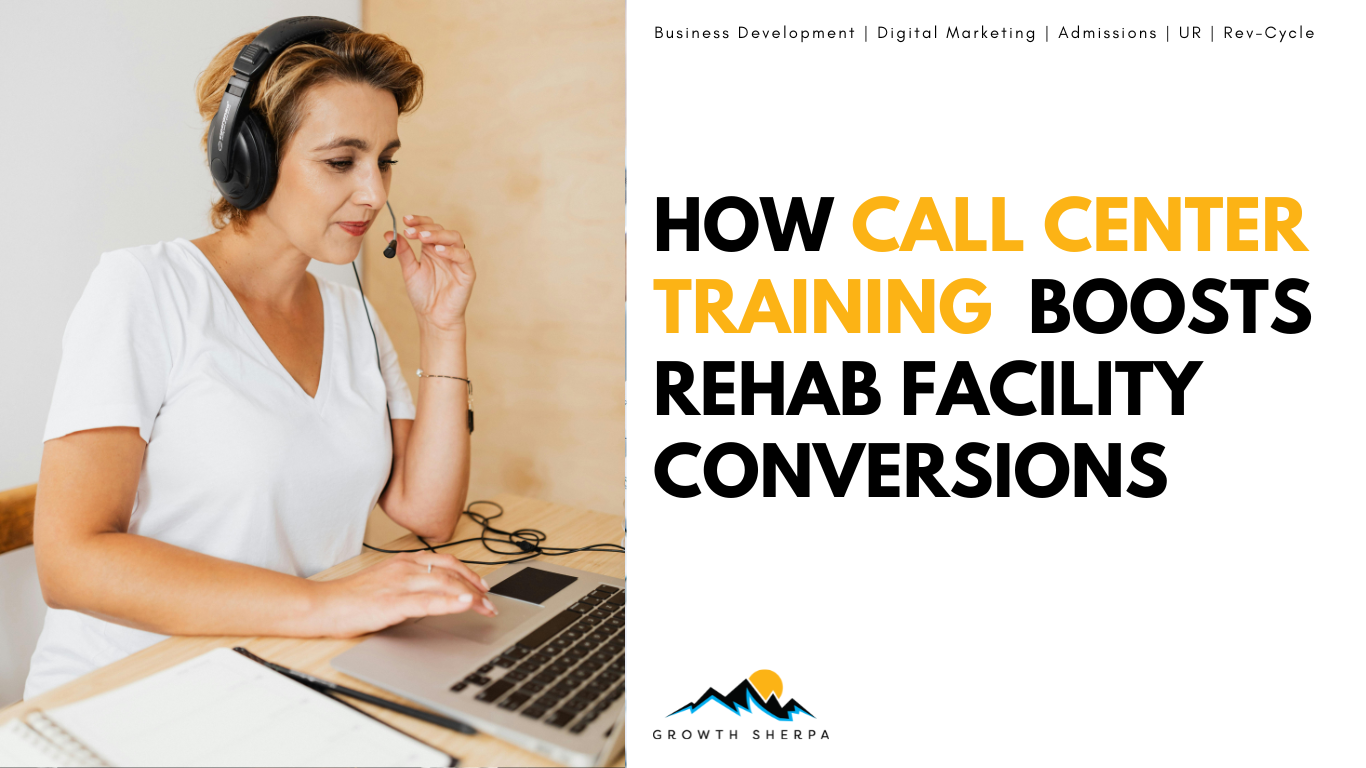When someone reaches out to a rehab facility, it’s often one of the most vulnerable moments in their life. Whether they are seeking help for themselves or a loved one, they need compassion, empathy, and expert guidance. For many addiction treatment centers, the first point of contact is a phone call to the admissions team or call center. These calls are not just inquiries; they’re opportunities to save lives. How your call center handles these calls can make or break the chance of converting a potential patient into an admission.
Call center training is essential to boosting conversions for rehab facilities. It ensures your team is equipped not only with the necessary communication skills but also the emotional intelligence to guide individuals toward the help they need. In this blog, we’ll explore the crucial role call center training plays in increasing conversions, how it directly impacts patient acquisition, and why investing in this training is vital to the success of your facility.
Why Call Center Training Matters in Behavioral Health
A rehab facility’s call center isn’t like the sales team at a typical business. These aren’t just leads — they’re individuals in crisis who need immediate attention, understanding, and reassurance. Call center agents must navigate a complex and often emotional conversation that involves not just answering questions, but also helping someone take the first step toward recovery.
Effective call center training ensures that your team knows how to handle these sensitive situations. Without proper training, staff may lack the tools to manage emotional conversations, potentially leading to lost conversions and missed opportunities to help someone in need. Furthermore, a lack of empathy or knowledge during a call can damage your facility’s reputation and trustworthiness.
On the other hand, a well-trained team can turn an initial inquiry into a meaningful conversation that builds trust and ultimately leads to a new admission. This is why training your call center team is not just a nice-to-have — it’s a critical part of your facility’s growth strategy.
The Elements of Effective Call Center Training
- Active Listening and Empathy
The ability to listen and show genuine empathy is perhaps the most important skill for call center staff in a rehab facility. People calling for addiction treatment are often in crisis, feeling overwhelmed or ashamed. They need to feel heard, understood, and reassured that help is available.
Call center training should emphasize active listening skills. Agents must be trained to listen for cues that go beyond what the caller is saying, picking up on emotional needs and underlying concerns. Empathy training can also help staff develop the emotional intelligence necessary to connect with callers on a human level. When callers feel like they are speaking with someone who genuinely cares about their well-being, they are far more likely to trust your facility and move forward with treatment.
- Thorough Knowledge of Services and Treatment Options
While empathy is critical, it must be paired with a deep understanding of your facility’s offerings. Callers often have specific questions about the types of treatments available, insurance coverage, length of stay, and other logistical concerns. If your team cannot answer these questions confidently and accurately, the caller may lose trust in your facility’s ability to meet their needs.
Call center agents must be trained to thoroughly understand all aspects of your facility’s programs — from detox to outpatient services. They need to be able to explain these services clearly and answer any questions that may arise. This includes understanding various treatment modalities (e.g., cognitive behavioral therapy, 12-step programs, holistic treatments) and knowing which programs best align with different types of addictions or co-occurring disorders.
Additionally, agents should be able to explain how the admissions process works, provide information on payment options, and address any concerns about insurance. Callers need reassurance that your facility is the right fit for their specific needs, and a well-trained team can offer that confidence.
- Handling Objections and Concerns
It’s common for callers to express hesitation or skepticism when considering rehab. They might worry about the cost, the time commitment, or whether treatment will be effective for them or their loved one. Call center training should include strategies for handling these objections without being overly pushy or dismissive.
Agents should learn to validate the caller’s concerns while gently guiding them toward a solution. For example, if a caller is worried about the cost, a trained agent can explain the various payment options, discuss insurance coverage, or suggest potential financing plans. If the concern is about the time commitment, agents can explain the different levels of care available, such as outpatient treatment, which allows for more flexibility.
By addressing objections in a compassionate and knowledgeable way, your call center team can reduce potential barriers to entry and increase the likelihood of conversion.
- Follow-Up and Persistence
Not every caller will be ready to commit to treatment right away, and that’s okay. Call center agents should be trained to follow up with potential patients without being intrusive. Sometimes, a gentle reminder or a follow-up call can be the nudge someone needs to take the next step.
Training should focus on building persistence into the process, ensuring that agents stay in touch with leads without overwhelming them. Timing and sensitivity are key here — agents need to know when it’s appropriate to follow up and how to do so in a way that shows they care about the individual’s well-being, not just the conversion.
Additionally, agents should be equipped with tools like customer relationship management (CRM) software to keep track of previous interactions, ensuring they have all the context they need to make each follow-up call meaningful.
The Impact of Call Center Training on Conversions
When your call center team is properly trained, the results are clear: higher conversion rates, more admissions, and improved patient acquisition. A well-trained team creates a positive first impression that sets the tone for the entire patient experience. Here’s how call center training can directly impact your rehab facility’s conversions:
- Improved Call Quality: Trained agents provide higher-quality interactions, which can lead to more meaningful conversations and greater trust. Callers who feel valued and understood are more likely to move forward with treatment.
- Higher Call-to-Admission Ratio: Training helps agents better manage calls, answer questions thoroughly, and address concerns with empathy. This can lead to more successful conversions from calls to actual admissions.
- Better Lead Management: With effective follow-up training, agents can re-engage leads who may not have been ready to commit initially. This persistence can increase overall admissions over time, ensuring no opportunity is missed.
- Increased Patient Satisfaction: Patients often base their decision to enter treatment on their initial phone call. A positive, empathetic interaction can improve patient satisfaction and reduce the chances of no-shows or early discharges, ultimately boosting your facility’s reputation.
Case Study: How Call Center Training Transformed a Rehab Facility’s Admissions
A mid-sized rehab facility in the Pacific Northwest was struggling to convert incoming calls into admissions. While their marketing efforts were generating plenty of inquiries, the conversion rate remained low. Upon reviewing their process, they realized their call center staff lacked the necessary training to handle sensitive, high-stakes conversations.
After investing in comprehensive call center training — focused on empathy, product knowledge, and objection handling — the facility saw a dramatic improvement. Within six months, their call-to-admission conversion rate increased by 35%. Not only did more patients enter their program, but the overall patient experience improved, leading to more positive reviews and increased referrals.
In the behavioral health and addiction treatment industry, the first phone call is often the gateway to recovery for many individuals. How that call is handled can significantly impact whether or not a potential patient decides to move forward with treatment. That’s why call center training is essential for boosting conversions and ultimately saving lives.
By focusing on active listening, empathy, product knowledge, objection handling, and follow-up strategies, you can transform your call center into a powerful conversion tool. A well-trained team not only helps your facility grow but also ensures that more people receive the life-changing treatment they need.
Investing in call center training isn’t just about improving your bottom line — it’s about helping more people begin their journey toward recovery.




